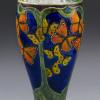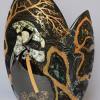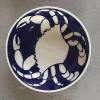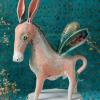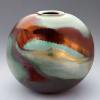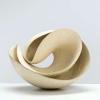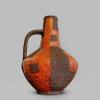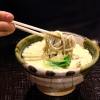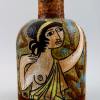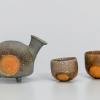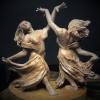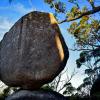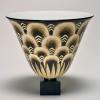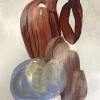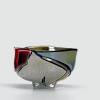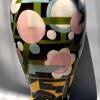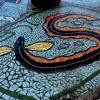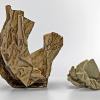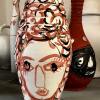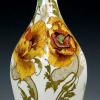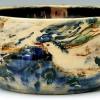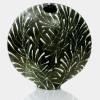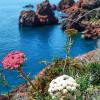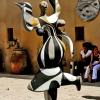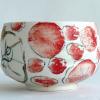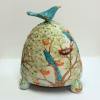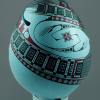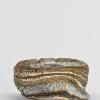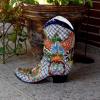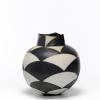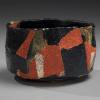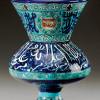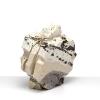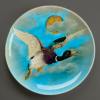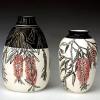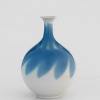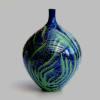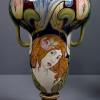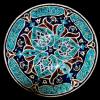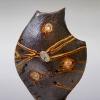
Birch branches and Cymbidium

Fruiting branch with NZ flax — Pat’s Ikebana
Qld, 2016
The traditional practice of the art of Ikebana was always approached with a mindfulness of the inner sublimity and is also known by the name ‘ofkado’ (way of flowers). Being originally developed by practicing temple monks, the spirit of ikebana has survived the centuries since its beginning and is embedded in Japanese culture. I have included a collection of ikebana arrangements from the Queensland Sogetsu ikebanist Pat Mackie, some examples from the Japanese artist Kawase Toshiro and ikebana created with ceramic vessels from the German ceramicist Jochen Ruth. Additional ceramic vessels that can be used for ikebana arrangements are also featured as well as some Indonesian ikebana form Lusy Wahyudi and friends.

Kawase Toshiro ikebana, Japan
Spatial awareness is altered by our higher consciousness, which has a distinct and tangible perspective, and this zone is infused into the aesthetic composition of ikebana. The inner calm of meditation flows from a deconstruction of the habitual clutter of the mind and ikebana became a visual metaphor for this refined state of consciousness. Observation of the innate beauty of the natural world from a heightened perspective was also a key influence and encapsulating this into a simple artistic statement was an integral component of ikebana flower arrangement.

Dick Lehman pottery
The Japanese arts in general have been derived from similar influences to the approach with the ikebama arts and the subtle appreciation of balance and space is ever present. In Zen philosophy there are seven aesthetic principles for achieving Wabi-Sabi.
Yugen: subtly profound grace, not obvious, Seijaku: tranquility. Datsuzoku: unbounded by convention, free, Fukinsei: asymmetry, irregularity. Kanso: simplicity. Koko: basic,.weathered, Shizen: without pretense, natural.
It’s easy to see these qualities also evoked in the ikebana arts.The beauty of ikebana exists as a subtle reminder of the depth of aesthetics and balance in nature and is a fine vehicle for reflecting this with indoor decoration.

‘Flower Arranging and Tea Ceremony’ – Toyohara Chikanobu (Japanese 1838-1912)
1895
During the Kamakura period (1192 ~ 1333) Ikebana became a form of meditation for Zen Buddhist priests. Floral offerings were placed in front of altars to honor the Buddha and the souls of the dead. These offerings evolved into floral arrangements designed to express the subtle harmony between spirit and matter. Arrangements were originally composed of three main lines of differing height together creating a three dimensional form – the balance between the lines symbolizing the unity between spirit, man and earth.
Japanese Samurai warrior painting
The warrior class or ‘Samurai’ brought great lifestyle changes to Japanese society during the Kamakura period, making it fashionable to display Ikebana arrangements in the homes of wealthy townsmen. Samurai would create Ikebana not merely as a flower arrangement but a short-lived structure reflecting man’s own mortality.
“Ikebana is a form of sculpture that exists only within a limited time span, transforms from moment to moment, then perishes.” — Akane Teshigahara
Samurai would live and die like an Ikebana form but their spirit was believed to be eternal. To reach a state of concentration and become centred, Ikebana was consistently performed by Samurai prior to going into battle. Through this connection with nature, the heart and mind were believed to be purified. Ikebana went on to gain substantial respect and appreciation by the imperial and military leaders of Japan in the Momoyama period (1573~1603), celebrated amongst the Samurai.
new.uniquejapan.com/origins-of-ikebana

Ikebana arrangement by Gunter Black, Australia, ceramic vessel by Jochen Ruth

Ikebana Ikenobo Rikka Shimputai by Lusy Wahyudi, Indonesia

Japanese Suzeki Stone

Ikebana Ikenebo Rikka Shimputai—Linda Prasasto

Akira Satake ikebana vase

Aya Sogetsu school of ikebana

Bauhiinia tree ikebana — One Kind of Branch—2013

Bitter melon and Chilli — Pat’s Ikebana

Ikebana Ikenobo Rikka Shimputai by Lusy Wahyudi, Indonesia

Ikebana Ikenobo Rikka Shimputai by Lusy Wahyudi, Indonesia

Goro Suzuki ikebana vessel

Ikebana Ikenob Jhiyuka — Yohanus Wemphy

Ikebana Ikenobo Rikka Shimputai by Lusy Wahyudi, Indonesia

Bromeliad and leaves ikebana — Pat Mackie
Pat’s Ikebana, 2016

‘Bromeliad leaves and blossom’ — Pat’s Ikebana
2016

Bunjin arrangement – Margot Wang
The Bunjin Arrangement is not bound by floral styles, and materials may be freely arranged to express one’s subjective view of plants. Emphasis is placed on the elegance and poetic nature of rare blooms, shrubs and plants.

‘Dark silence in suburbia’ – Yo Akiyama

Dineke Beereboom — ‘Two Of A Kind’

Emily Katz ikebana
Pura Vida Peartree workshop

‘Eucalyptus branches and Bougainvillea’ – Pat’s Ikebana
2015

Small vintage celadon vase

‘Gold Bullion Tokkuri’ vessel – Ryota Aoki

Green Arrangement – Pat’s Ikebana
2015

Bizen stoneware vase, with the characteristic reddish hidasuki or “fire-marked” pattern,

‘From the Wind’~ Bonsai (盆栽) by Vaclav Novak – Fukinagashi Pinus uncinata

Ovoid Honda aluminium die cast vessel adapted to an Ikebana display
Utsuwanote

Ikebana display by Anita Haase Schönbeck, Berlin with ceramic vessel by Jochen Ruth

Ikebana by Mario Hirama, Japan

Calla lily, pine and bamboo stick

Ikebana arrangement by Gunter Black, Jochen Ruth vase

Spring blooms ikebana – Magnolia, snapdragon and succulents
2017

Ikebana by Gunter Black, Jochen Ruth vessel

Ikebana by Hans Riester, Berlin & ceramic vessel by Jochen Ruth

Ikebana floral arrangement by Hans Riester,Berlin — ceramic vase by Jochen Ruth

Ikebana by Karin Kopp, Ritterhude & Jochen Ruth ceramic vessel

Ikebana by Karin Kopp & Jochen Ruth ceramic vessel

Red Zen ikebana vase – Georgetown Pottery

Ikebana by Truus Esther-(Otomodachi)

Ikebana Ikenebo Rikka Shimputai—Lusy Wahyudi

Ikebana ‘On the way to the top’ (Otomodachi)

Ikenobo arrangement with pink blossoming flowers – Otomodachi

Starry Night ikebana vase – Georgetown Pottery

James Oughtibridge sculptural vase

Japanese Red Maple bonsai
Moss and Stone Gardens

Jochen Ruth

Katsunori Sawa

Kurokawa Tōru — Ceramic sculpture vessel
Mirviss Gallery

Flat round incised vessels – Lamella

Hanamai Ikebana – Amaryllis, Aspedistra, Sibirian Dogwood

Leaves only in horizontal arrangement — Pat’s Ikebana
2015

Mihara Ken

Pat’s Ikebana
2013

‘Vine and giant Allium’ – Pat’s Ikebana
2016

‘Bromeliad and leaves’ – Pat’s Ikebana

Peter Voulkos ceramic ovoid vessel

‘Poinchiana Podas and Ixora’ — Pats Ikebana
2015

Raku Vase Mountain carved — Blue Spruce Pottery

Kawase Toshiro Red Blossom ikebana, Japan

Shino Suzuku vase —Goro Suzuki

‘Straight Lines’ – Pat’s Ikebana
2016

Corylus avelana contorta, the twisted hazelnut ikebana

Shoka shimputai ikebana – Lusy Wahyudi

Zen garden – Tokyotimes

Kawase Toshiro ikebana, Japan

‘Gold forest in high mountain’ – Suseki Gohua stone

Ikebana arrangement

Wood fired Vase by Shiho Kanzaki, Japan

Ikebana display – The Nordic Lotus Ikebana Blog

Poinchiana Pods construction- Pat’s Ikebana
2015

Ikebana ‘Leaping salmon’ by Otomodachi (flickr)

‘Walking Iris and lilly’ – Pat’s ikebana
2016

Wattle and Anthurium – Pat’s Ikebana
2016

‘Woody Pear and Ixora’ – Pat’s Ikebana
2016

Japanese Yakuza tattoo figure

Yasuhisa Kohyama ceramic ikebana vessel

‘Black Pottery–Moon Trip’ — Yoshihiro Kunikata

Pavel Zamikhovsky 2011

Floral Ikebana – Mai Van Thai Thomas

Ikebana ‘Red and pink fireworks’ cascading Ohara style by Otomodachi

Ikebana Rikka-Shimputai by Lusy Wahyudi







